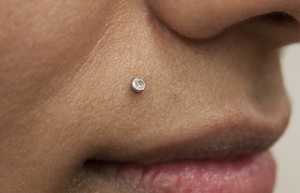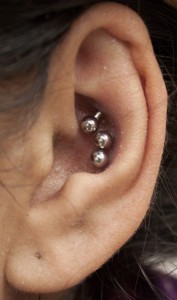I used to share little sympathy for people with body piercings who complain about their lack of social acceptance, despite having piercings of my own. I always thought that people with piercings should know that they may be looked at differently. They’ll probably have to work harder compared to people without piercings to prove that they’re not abject, ambitionless low lifes. They should know what they got into when they decided to get pierced, so I personally didn’t care to lend a shoulder to cry on when they got certain stares. 
Then my mom negatively commented on my monroe piercing that she thought I had removed years back, and that’s where it all started. For those that don’t know what a monroe is, it’s a stud pierced off center on the upper lip, not on the actual lip itself.
My mother was debating whether or not to let me go to Cancun for spring break, but eventually said no due to my lack of judgment.
“I don’t like that lip thing you wear when we’re (my parents) not around. It shows you have bad judgment,” she said.
Of course, I brought up the fact that my older, accomplished sister has both her nose and navel pierced, while I just have my monroe. My mom swiftly responded with, “Well, yours is worse.”
I love my mom unconditionally, but seriously, my piercing is no “worse” than either of my sister’s piercings. I was puzzled and slightly angered by my mom’s response, but I wanted some other opinions.
I went to my best friends, the ones that honestly tell me if I look hideous before going out. Though they didn’t entirely agree with momma Maharaj, they thought my sister’s nose stud was more acceptable in society compared to my monroe. 
My anger and confusion dissipated, but my prior ambivalent sentiments grew more directed. I believe there is no single piercing that’s any more negative than another, as long as it’s not in a provocative area (personally, I think that type of body art is on a different level).
For example, someone with a nape piercing (a piercing on the back of the neck) shouldn’t be looked down upon compared to someone with her or his cartilage pierced solely because the latter piercing is more common. The ubiquity of a piercing shouldn’t correlate with its appropriateness.
I thought it was unfair that when I worked at a restaurant my senior year of high school, I was told to remove my monroe. However, the other hosts didn’t have to remove their nose studs or any types of ear piercings. I understand the business’ standing on the issue; they don’t want hosts who have “weird” piercings greeting customers. But it all stems back to society’s view on these “abnormal” piercings. It’s society’s intolerant nature toward the unknown, the different, and the unique that upsets me. In fact, I find this sentiment strikingly similar to the reasons behind racism.
Don’t get me wrong; I understand the stigma attached to piercings. Over a quarter of people with body piercings have spent three or more days in jail, 22 percent use drugs and 19 percent never finished high school, according to a national data set done by Laumann and Derick. It’s an unfair connotation, but the statistics are very telling. 
Still, I find it unnerving how resistant people are to difference and change. People, like my wonderful mother, see a nose stud and think it’s fine but see a monroe and think it’s “worse.” The piercings are the same size, but its location is different. Its prevalence is different. Basically, it’s different. And if I haven’t beaten this point to a pulp already, people are less inclined to accept the different.
Can you blame people like my mom though? She doesn’t create these assertions based on meanness, it’s simply how she and the majority of people grow up: initially not accepting change. This resistance and lack of acceptance can channel through many avenues in varying magnitudes. It can range from people not wanting to try new bars or running paths, to people finding certain piercings bad—ultimately judging the person’s character—or not associating with different races.
I try to eschew this mentality whenever possible. I frequently try new restaurants with different food, perform different workouts, listen to different music and talk with people from all over the globe. I purposely aim for living a non-routine life, though it’s difficult to do.
To conclude this piece, fight negative preconceived notions. If you come across a piercing that deviates from the norm, don’t be so quick to judge. Accept difference; it can be a beautiful thing.
Geena Maharaj can be reached at maha8007@stthomas.edu.


Whoa, whoa, whoa. I thought we were supposed to be professional? Piercings are certainly not professional.
I had a monroe piercing for about a year and a half, but took it out last summer because I just felt weird with it in. I was in a professional setting, and it got to the point where I was just ready to “grow up.”
I’m not saying that the piercing is immature or anything, but the stigma that comes along with having such piercings is there. I think there are some work environments that can easily deal with a facial piercing, and there are some that don’t have room for ANY type of acceptance for facial any piercings. I don’t believe that means that there’s anything “wrong” with our society because of this, I just think that jobs find certain piercings distracting. I felt like mine took away from my talent and personality, because people were focused on what I had on my face, and not my job performance.
It was cool, having it for a while. But then I took it out and now have a hole in my lip that will (probably) forever be there. Be cautious.
Interesting perspective on this issue. I think this applies to other larger issues such as those applying the GLBT community and to racism (as mentioned in the article). Though the percentage of GLBT individuals who are out and proud has been on the rise because society is on its way to becoming more accepting, it is still an issue because they are still the minority in the population. GLBT couples have a difficult time walking around simply holding hands without receiving massive amounts of judgmental stares. This is because it is much less common to see than a heterosexual couple holding hands or kissing in public.
What is the connection between a monroe and GLBT community?
There is no ‘norm’ apart from that which we create for ourselves. If we are comforatble with the way we represent ourselves, it should not matter what other people think (and they are going to think a lot). One has to show that they are a lot more than what other people’s perceptions.
@John: The author is saying that monroe piercings are not as accepted because they are not as common in our society. They are different from the norm. I’m saying that this could be one possible reason (among many others) so many people are still against the GLBT community. The more people are exposed to something, the more comfortable with it they become.
This seems less like an article and more of an outlet for her to cry about mommy not letting her go to Cancun. The choice to get a piercing on your face to mimic one of the most sexual figures of American culture clearly shows a lack of professionalism and it’s understandable why you might not be taken seriously in certain settings. Get real.
@Kathleen, I hardly think your comment is fair, let alone professional and respectful. Yes, Marilyn Monroe was a very sexual person, especially for her time, but she was more than that. She was (and for many, still is) a role model for positive body image and self-respect. Piercings, tattoos, hair color, hair style, make-up usage: these are all artistic ways to express yourself in your every day life. This is a modern time, a modern day. It is becoming much more acceptable to have tattoos, piercings, and hair styles out of the norm. Geena conducts herself in a very professional manner, both in and outside of the workplace–I have direct experience with that. Her piercings do not define her, nor do they limit her like your closed mind does you.
@Geena, I completely understand where you’re coming from in this article. However, at some point, you may find yourself having to make a decision between keeping something as simple (although it may not be simple to you) as a piercing, or landing a certain job that may even be your dream job. Taking out a piercing does not mean you’re growing up, but making that sacrifice in order to do what’s best for you IS. Who knows, you may not have to do that, though!